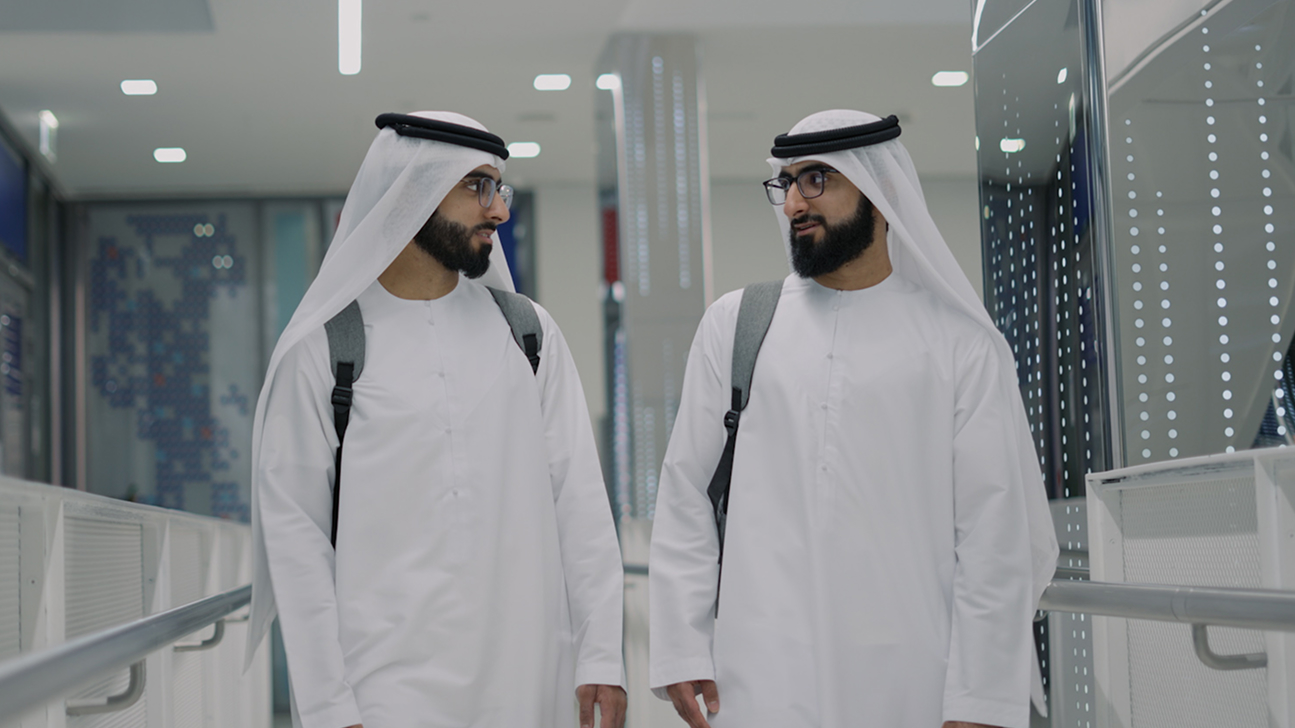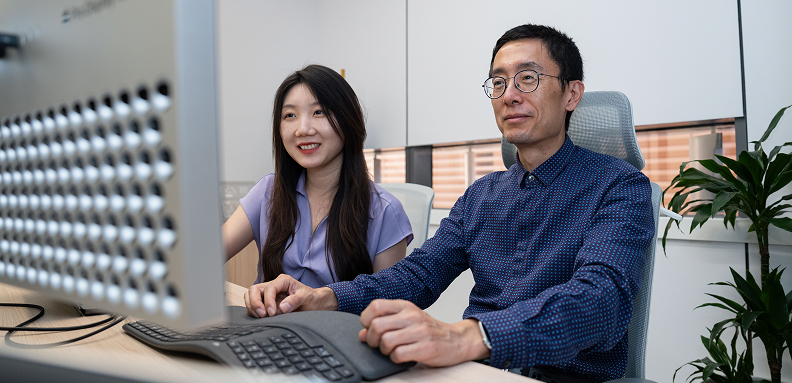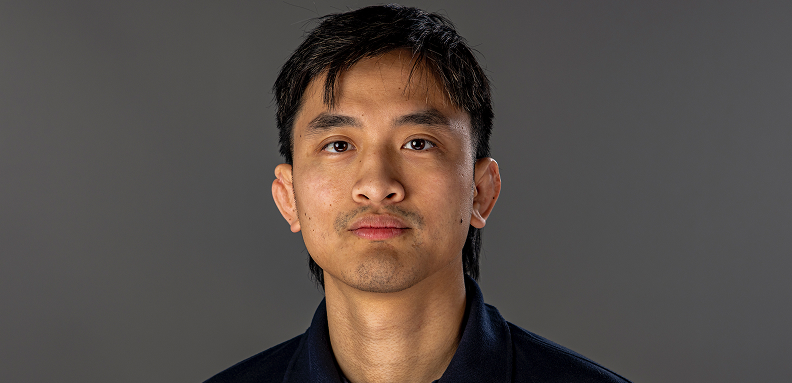Not your typical digital twins: How two Emirati brothers are using AI to make the UAE’s roads safer
Friday, July 11, 2025

When Abdulla and Abdulrahman Almarzooqi walk into a room, it’s hard not to do a double take. To the human eye, the identical twins are almost entirely indistinguishable from one another. Even sophisticated technology struggles, with facial recognition software often unable to tell them apart, they say.
But it’s not just looks that the Emirati brothers share. Throughout their academic journey, they’ve shadowed each other through school halls, university labs, and, most recently, the graduation stage at Mohamed bin Zayed University of Artificial Intelligence’s (MBZUAI) Class of 2025 Commencement ceremony.
The duo both received a Master of Science in Machine Learning, both focusing on transportation safety, and both with the desire to use AI to solve real–world problems. But if you look closely enough you can see the nuances and differences in their work that sets them out as individuals: Research journeys that – though closely aligned – took distinct paths, each carving out a unique niche.
Abdulla’s thesis, ‘Multimodal Agentic System for Highway Safety Monitoring’ focused on highway safety, developing two agentic systems: one for describing driving scenes and another for generating automatic accident reports. Abdulrahman, on the other hand, looked inside the car with an ‘Agentic AI Framework for In–Vehicle Safety’, using cabin sensors and AI agents to detect driver fatigue, phone usage, seatbelt use, and even child distraction.
“His system focuses on the external world and monitoring conditions – the road, the weather, the accident,” Abdulrahman explains. “Mine looks at the in–cabin factors that can cause those accidents in the first place. Together, they create a full picture.”
One car, two perspectives
Abdulla and Abdulrahman’s systems are both built using Multimodal Large Language Models (MLLMs) and agentic AI – the next frontier in AI where multiple autonomous agents handle specialized tasks, working collaboratively to achieve a complex goal. Think Iron Man’s J.A.R.V.I.S., but for traffic safety.
These intelligent systems have been fine–tuned with prompt engineering and other tuning methods to work like a human in assessing situations both inside and outside of vehicles.
What sets Abdulla’s first system apart from traditional systems is its integration of a computer vision model to analyze images and objects with MLLMs, enabling deeper situational understanding. He says a key application would be advanced driver–assistance systems (ADAS) to alert drivers to potential hazards in real–time and potentially save lives.
The second system functions like a digital witness to roadway events. Using dashcam footage and sensor data, it automatically identifies accidents (signaled by airbag deployment) and compiles comprehensive reports using inputs from five specialized agents – monitoring everything from weather to seatbelt usage.
“Traditionally, accident reporting is manual and time–consuming,” Abdulla says. “My system streamlines and automates the process to support timely decisions.”
For Abdulrahman, the car itself becomes an intelligent co–pilot. His AI agents work together to assess risk factors inside the cabin – whether a driver is drowsy, holding a phone, or a child is unrestrained in the backseat. The final output? A personalized, conversational safety report that keeps drivers informed and alert.
“The benefits are tangible,” they say, listing potential advantages such as reduced accidents, improved insurance processing, faster emergency response times, and higher driver and passenger compliance.
“Ultimately, everyday drivers will get the biggest gains,” Abdulla adds.
The brothers’ supervisor, professor of machine learning, Fakhri Karray, was instrumental in shaping both research paths. Known globally for his work on smart cities and intelligent systems, he offered them guidance, support, and plenty of challenging questions.
“His mentorship provided us with a clear path through complex research challenges, and his confidence in our abilities inspired us to aim higher,” Abdulla says. “He was always available for thoughtful guidance, helping us overcome setbacks and refine our work.”
The high praise is reciprocal with Professor Karray acknowledging their exemplary ethics and unwavering commitment to all aspects of their work. “Their integrity, sense of responsibility, and dedication to both their studies and the wellbeing of those around them set a high standard for their peers,” Professor Karray says. “They are role models whose positive attitude and strong moral character truly distinguish them as outstanding students.”
Pushing each other to greater heights
While each has their own research focus and individual expertise, it’s hard to ignore the importance of each brother to the other’s academic growth.
“We were always very close growing up,” Abdulla says. “We did almost everything together – whether it was playing, studying, or just spending time at home. Having someone by your side who understands you so well made our bond strong, and that closeness has stayed with us over the years.
“Now, we’re each other’s first line of support, quality control, and motivation.” Abdulrahman adds: “We push each other to improve and grow.”
That synergy has paid off. They won first place in the 2023 Emirates Skills National AI Competition, and each credits the other for helping them meet tight thesis deadlines and overcome research roadblocks.
More recently, Abdulrahman won first place in the coding category at the Global Prompt Engineering Championship 2025 during the inaugural Dubai AI Week, receiving his award from H.H. Sheikh Hamdan bin Mohammad bin Rashid Al Maktoum, Crown Prince of Dubai and Deputy Prime Minister of UAE. Sharing in AED 1 million of prize money, his AI emergency response assistant app offers real–time support for a range of crises from lost passports to urgent medical help.
Built in the UAE, for the UAE
The duo are also driven by a common desire to give back to the UAE – something they share with 18 other Emiratis to have graduated as part of MBZUAI’s Class of 2025.
Emiratis were the largest nationality represented at this year’s Commencement – which also includes the University’s first Emirati Ph.D. graduate, Salem AlMarri – as the University continues to fuel the UAE’s ambition to lead an AI–driven future.
For their part, Abdulla and Abdulrahman would like to see their systems integrated into next–gen vehicles as a core safety feature, leveraging in–cabin sensors and multimodal AI to continuously assess interior and exterior conditions. In smart cities such as Abu Dhabi, they could connect to intelligent traffic systems, enhancing road safety and efficiency through real–time data sharing and proactive risk management.
“AI is not just about building smarter systems,” Abdulrahman says. “It’s about building a smarter society. Our projects align with the UAE’s push for smart cities and intelligent infrastructure.”
And as they turn their attention to the next phase of their careers, they are eager to use their skills to solve these types of real–world problems, and others. “I want to be part of a team that’s pushing the boundaries of technology, creating solutions that make a difference – potentially even leading to entrepreneurial ventures down the road,” Abdulrahman adds. “Our research can contribute significantly to the UAE’s vision for technological leadership on the global stage.”
Whatever steps they take next, the brothers’ advice to other aspiring Emirati students is clear.
“Be prepared to work hard and stay curious, because the field of AI is constantly evolving,” says Abdulrahman.
“And be prepared to step outside your comfort zone too,” adds Abdulla. “You’ll be surprised by what you can achieve.”
- machine learning ,
- graduation ,
- alumni ,
- graduates ,
- commencement 2025 ,
- commencement ,
- MLLMs ,
Related
The search for an antidote to Byzantine attacks
A new study from MBZUAI and other institutions tackles malicious and faulty updates in privacy-preserving machine learning.....
Read MoreNot just another deck: how MBZUAI’s okkslides is redefining executive communication
The MBZUAI startup is turning messy research and organizational context into decision-ready narratives with a human-in-the-loop AI.....
Read MoreAlumni Spotlight: driving AI transformation at a financial giant
MBZUAI alumnus Steven Hoang explains how he is using his master’s in machine learning to help shape.....
- student ,
- Alumni Spotlight ,
- finance ,
- alumni ,
- machine learning ,


